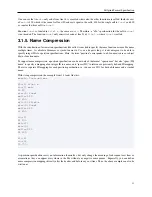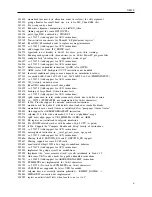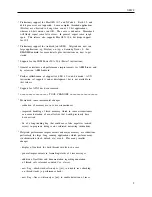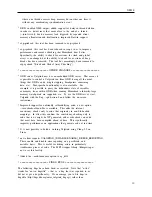
2. NEWS
Release 3.8.0 (10 August 2012)
~~~~~~~~~~~~~~~~~~~~~~~~~~~~~~
3.8.0 is a feature release with many improvements and the usual
collection of bug fixes.
This release supports X86/Linux, AMD64/Linux, ARM/Linux, PPC32/Linux,
PPC64/Linux, S390X/Linux, MIPS/Linux, ARM/Android, X86/Android,
X86/MacOSX 10.6/10.7 and AMD64/MacOSX 10.6/10.7.
Support for recent
distros and toolchain components (glibc 2.16, gcc 4.7) has been added.
There is initial support for MacOSX 10.8, but it is not usable for
serious work at present.
* ================== PLATFORM CHANGES =================
* Support for MIPS32 platforms running Linux.
Valgrind has been
tested on MIPS32 and MIPS32r2 platforms running different Debian
Squeeze and MeeGo distributions.
Both little-endian and big-endian
cores are supported.
The tools Memcheck, Massif and Lackey have
been tested and are known to work. See README.mips for more details.
* Preliminary support for Android running on x86.
* Preliminary (as-yet largely unusable) support for MacOSX 10.8.
* Support for Intel AVX instructions and for AES instructions.
This
support is available only for 64 bit code.
* Support for POWER Decimal Floating Point instructions.
* ==================== TOOL CHANGES ====================
* Non-libc malloc implementations are now supported.
This is useful
for tools that replace malloc (Memcheck, Massif, DRD, Helgrind).
Using the new option --soname-synonyms, such tools can be informed
that the malloc implementation is either linked statically into the
executable, or is present in some other shared library different
from libc.so.
This makes it possible to process statically linked
programs, and programs using other malloc libraries, for example
TCMalloc or JEMalloc.
* For tools that provide their own replacement for malloc et al, the
option --redzone-size=<number> allows users to specify the size of
the padding blocks (redzones) added before and after each client
allocated block.
Smaller redzones decrease the memory needed by
Valgrind.
Bigger redzones increase the chance to detect blocks
overrun or underrun.
Prior to this change, the redzone size was
hardwired to 16 bytes in Memcheck.
* Memcheck:
3
















































